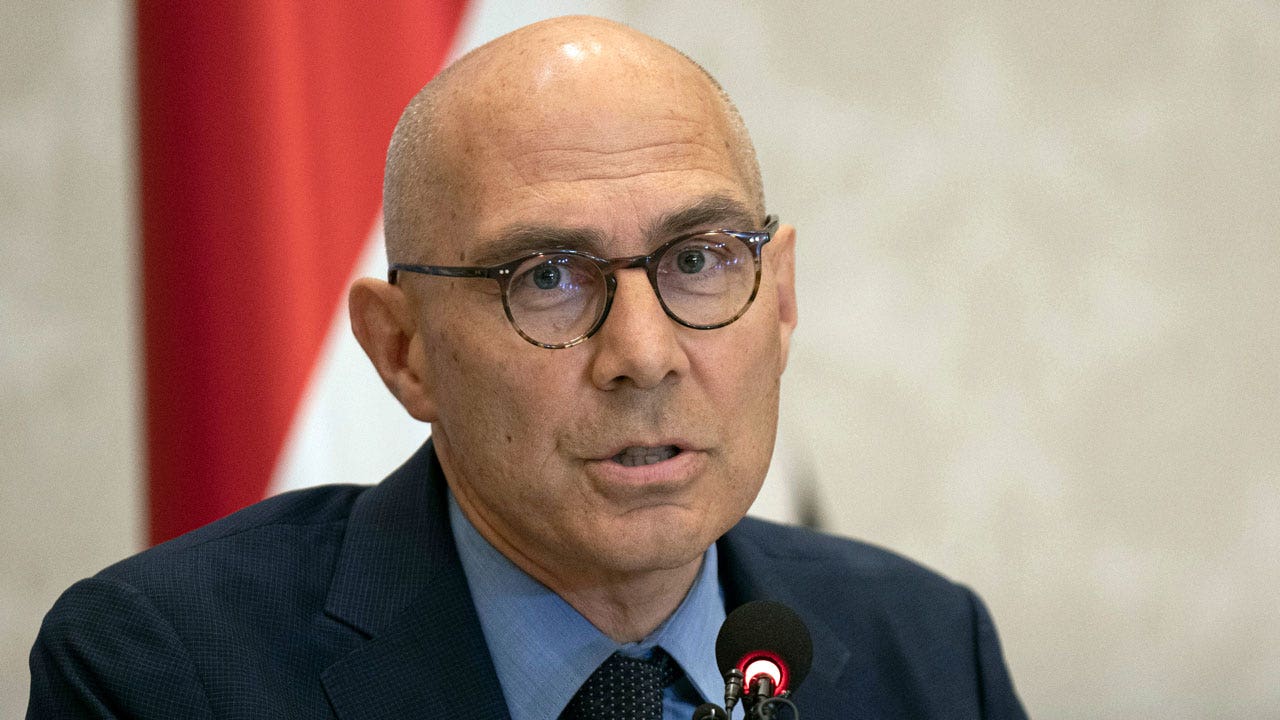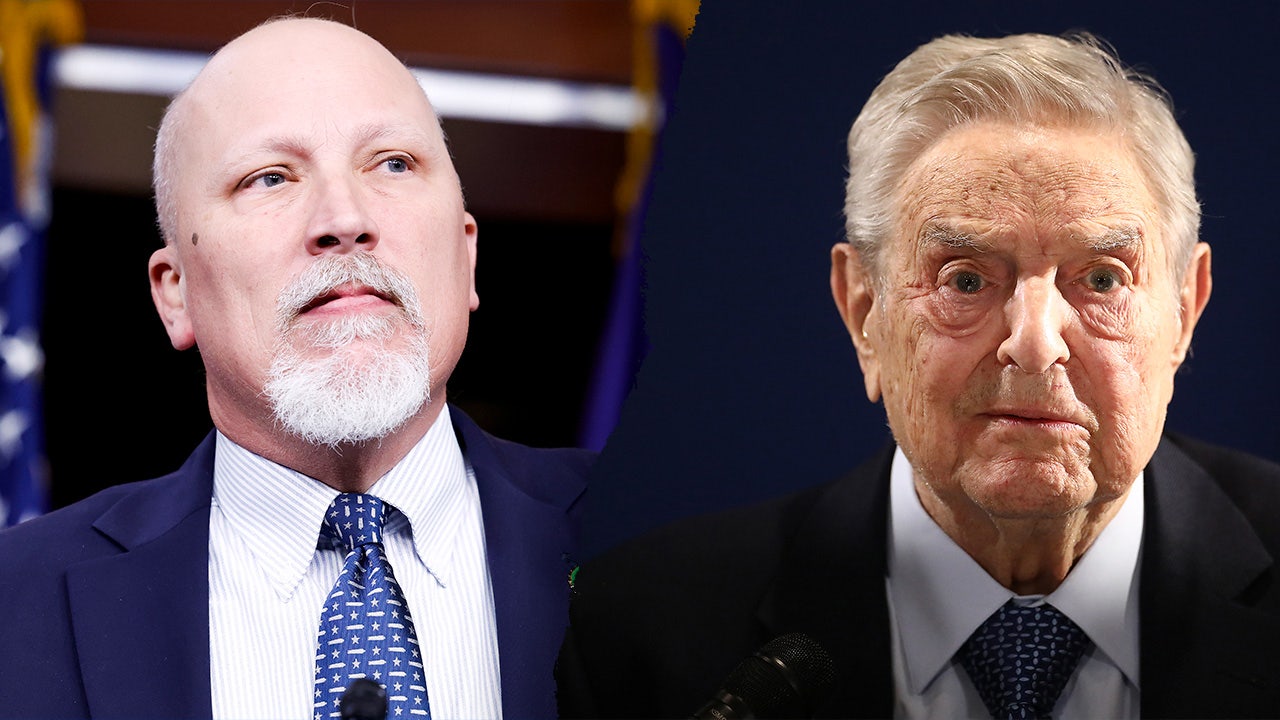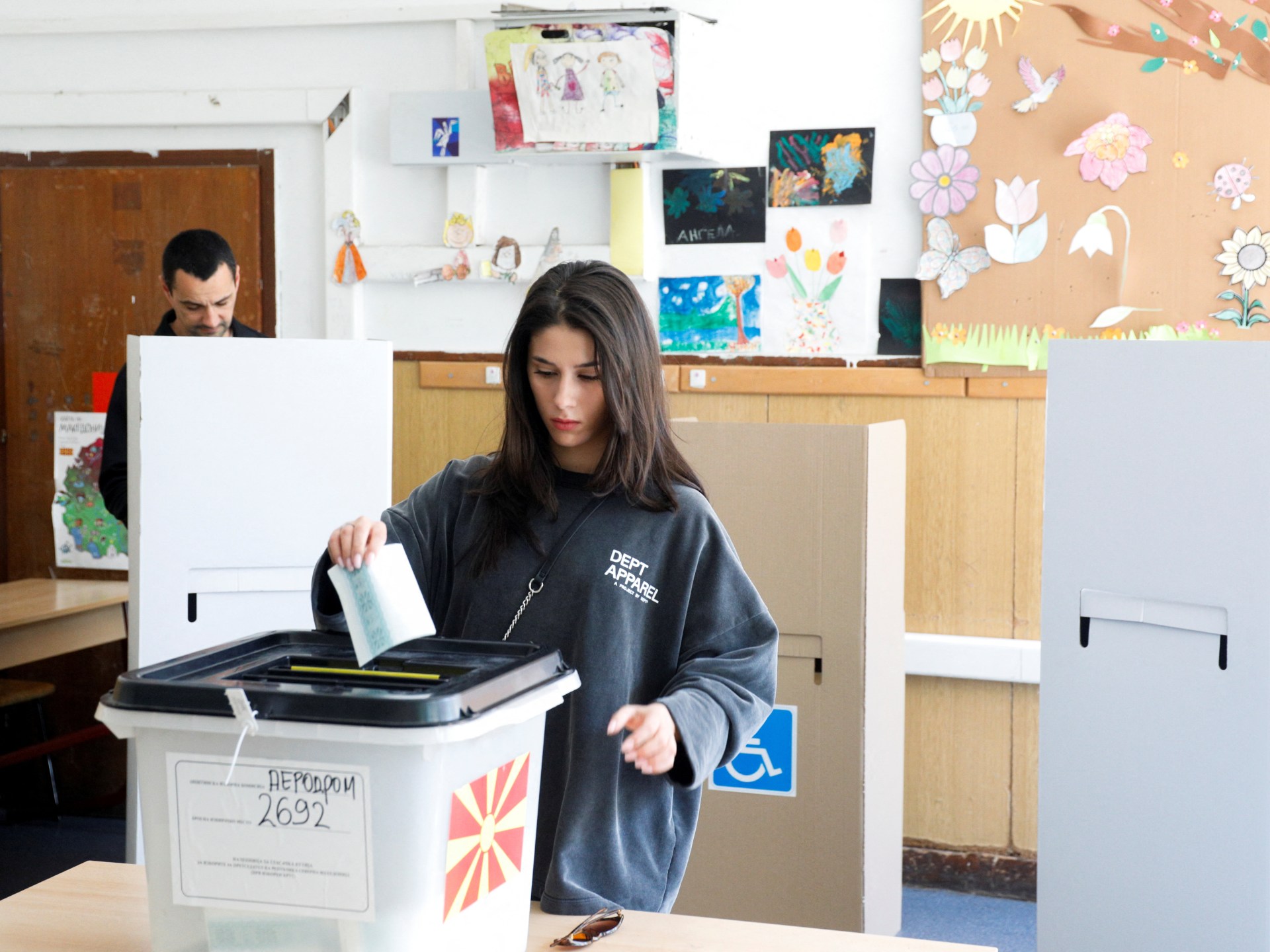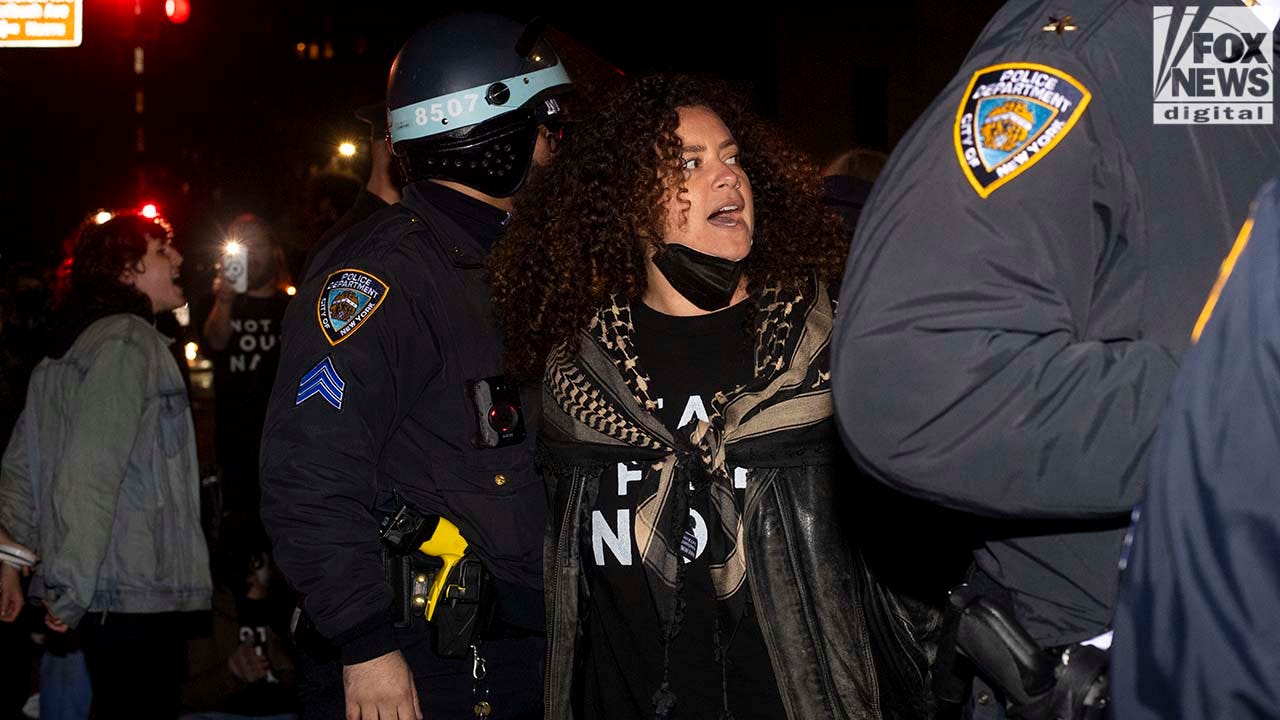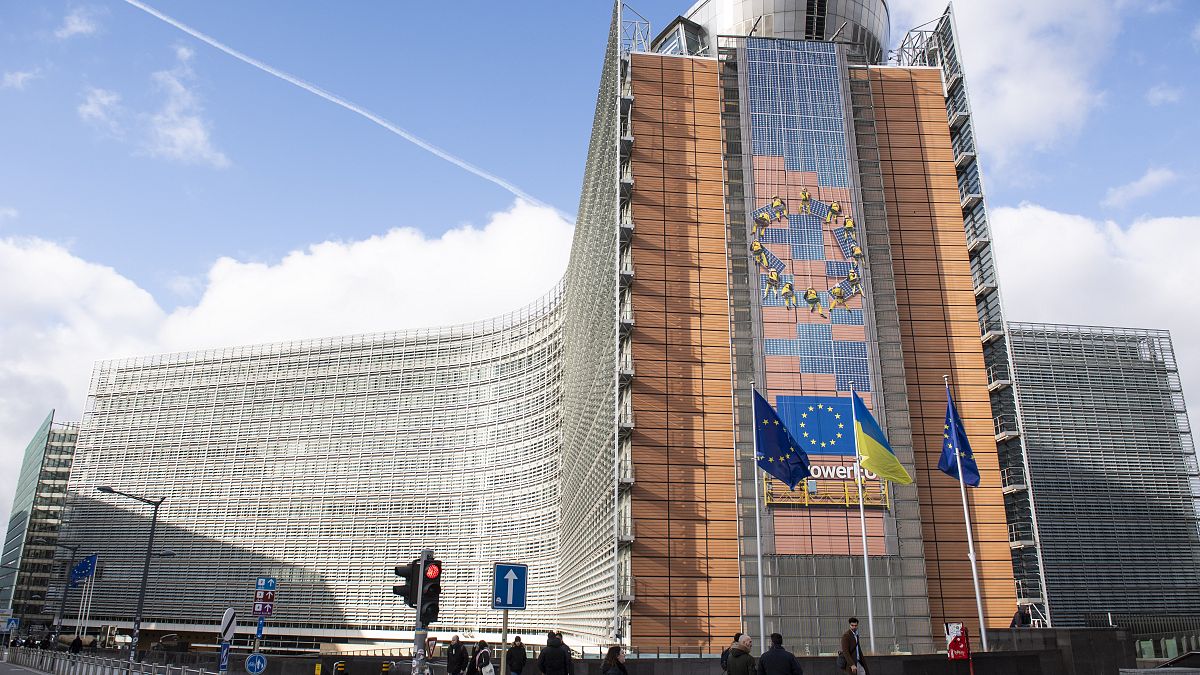Business
Column: Right-wing hatemongers count on the cowardice of companies such as Target
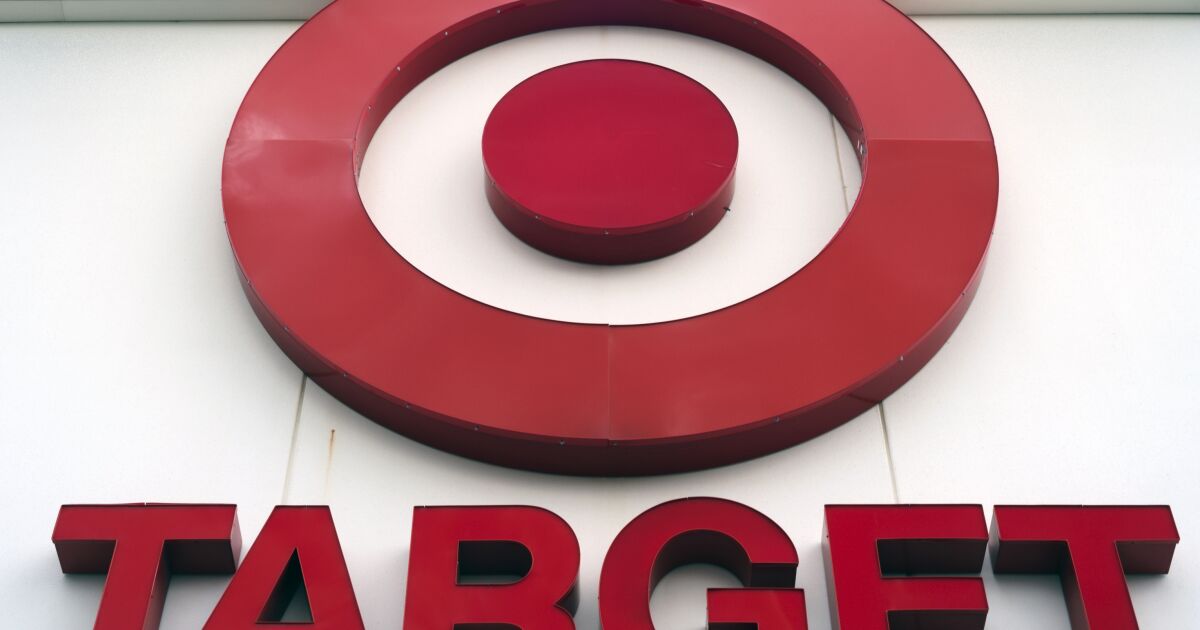
If there’s a company in America you’d expect to have the gumption and spirit to see off a stupid and specious attack on the selling of LGBTQ+-themed merchandise for Pride Month in June, it would be Target.
After all, the Minneapolis-based company is one of America’s biggest retailers, racking up more than $100 billion a year in sales. Only two weeks ago, its chief executive, Brian Cornell, was boasting that “our long-standing commitment to diversity, and equity, and inclusion … has fueled much of our growth over the last nine years.”
Yet when the braying mob of anti-LGBTQ+ reactionaries targeted Target, the company folded like a cheap off-the-rack suit. It told personnel in many stores to shrink or even eliminate their Pride-themed merchandise displays or move them to less conspicuous sections of the stores. Some LGBTQ+ designers say their products have been taken off the shelves.
Target explained its reaction by citing physical threats to its store workers from anti-LGBTQ+ militants. But something more is going on here, and Target’s response doesn’t show the company in a good light.
The context is a concerted effort from the right wing to demonize the LGBTQ+ movement and thereby make any outreach or even acknowledgement of this community toxic for consumer businesses. The goal is to disappear these people and their advocates, reversing a decades-long trend toward acceptance, equity and inclusion.
“Our long-standing commitment to diversity, and equity, and inclusion…has fueled much of our growth over the last nine years.”
— Target CEO Brian Cornell, just before the company downplayed its merchandising of Pride-themed goods
The attacks take many forms, all of them chiefly employed by Republicans and their right-wing acolytes and all of them equally factitious.
Sometimes LGBTQ+ people are accused of being pedophiles who “groom” children for abuse. Sometimes the anti-queer movement is cast as an arm of the right’s attack on “wokeness,” which is just another way of promoting the idea that only straight white males count in this U.S. of A.
Anti-”wokeness” is the chief theme of Florida Gov. Ron DeSantis’ presidential ambition tour. As is well known, DeSantis has been on the warpath with Walt Disney Co., one of his state’s leading employers and economic engines, over the company’s public criticism of his so-called “Don’t Say Gay” law, which suppresses classroom references to gender identity.
(During his glitch-beleaguered May 24 presidential campaign launch on Twitter, DeSantis ludicrously accused Disney of “trying to inject matters of sex into the programming for the youth.”)
There’s no evidence that anti-queer militants comprise anything but a tiny minority of the American public. When they act in concert and their efforts are fueled by social media, however, they can appear to be weightier than they are.
That’s probably what accounted for the pusillanimous reaction of Anheuser-Busch to a right-wing, social-media driven campaign against its Bud Light beer, after the company’s marketing department launched a publicity campaign with transgender influencer Dylan Mulvaney.
Anheuser-Busch not only issued a wan statement of regret for the marketing outreach, but sidelined the two marketing executives responsible for the campaign. Given that their assignment had been to revive the brand’s fading popularity, Anheuser-Busch’s effective demotion of the executives signaled to the boycotters that their voices had been heard. That wasn’t a positive corporate message, to say the least.
Anheuser-Busch stock has fallen by about 20% in the last two months, while the boycott has been in full cry. Target shares have fallen by about the same percentage since mid-May.
To some extent, it’s unfair to blame the far-right for launching boycotts against brands they choose not to like. I’ve defended consumer boycotts in the past, in principle. But all boycotts are not created equal.
There’s a qualitative difference between those directed at noxious behavior, such as the open racism of Tucker Carlson or the bloodlust of the National Rifle Assn., and those directed at efforts to promote tolerance and equality. One knows boycotters by their boycottees.
That brings us back to the companies’ hasty responses. These have been widely misjudged. Alex Shepherd of the New Republic cursed “total, preemptive capitulation” by Anheuser-Bush and Target to the anti-LGBTQ+ boycotts as “profoundly un-American.”
If only they were. Corporate America’s response to even a hint of controversy, no matter how specious the boycotters’ objections, is as American as apple pie. As we’ve seen time and time again, consumer companies are notable not for their steadfastness in defending the public interest, but their cravenness. That’s especially so when, as is the case with the Bud Light and Target campaigns, the context is overtly partisan.
Remember all the companies that pledged to cease or at least suspend campaign contributions to the 147 Republican representatives and senators who voted to overturn the 2020 presidential election? Many, if not most, have gone back on their promise.
Among them, according to ProPublica, are Home Depot, which by the end of 2022 had donated to 65 of the election deniers, and Boeing, which funded at least 74. Toyota, to give it begrudging credit, was at least candid about the thought process involved in resuming contributions to supporters of the Jan. 6, 2021, insurrection: It selected politicians that could carry its water in Washington.
“Toyota supports candidates based on their position on issues that are important to the auto industry and the company,” the company told me in June 2021. “We do not believe it is appropriate to judge members of Congress solely based on their votes on the electoral certification.” To put it another way, “money talks, democratic principle walks.”
Many corporations will say for the record that they believe in women’s healthcare rights. But when a horrifically punitive anti-abortion law went into effect in Texas in 2021, the silence from the corporate community was deafening. It still is; not a peep of protest has come from Texas-based big businesses such as American Airlines, Texas Instruments, Dell and Hewlett Packard Enterprise — even though the law is certain to make recruiting women for important jobs harder for them.
One problem in assessing the campaigns against Bud Light and Target is a lack of clarity about their results. It’s hard to be sure whether Bud Light’s continuing sales slump is due to the anti-woke publicity or to the fact that, not to be indelicate, the product tastes like it’s been strained through a horse.
Target muddied the waters in its own case by explaining that it minimized the displays of Pride-themed merchandise to protect its employees from violence.
There are, of course, other ways to achieve that end, including by stepping up security in vulnerable stores and making clear that it will prosecute the hell out of anyone who commits or threatens to commit an assault on its premises.
Target has also let it be known that the merchandise it removed from inventory was from a single British designer whose work has exploited satanic imagery. The company’s website, anyway, is replete with Pride-themed goods.
One would hope that companies that become objects of ideologically inspired campaigns like these don’t think they can mollify the torch-bearing mob. If they think they can immunize themselves, they can take a lesson from the experience of Chick-fil-A.
The fast-food chain became the target of localized boycotts in 2012, when CEO Dan Cathy publicly voiced the conviction that gay marriage violated God’s plan.
Progressive politicians in Boston, Philadelphia and Chicago, among other places, threatened to ban Chick-fil-A stores from their jurisdictions. Calls for boycotts erupted on Facebook and Twitter. The company issued a statement disavowing Cathy’s viewpoint as a matter of corporate policy. A sort of reverse boycott occurred, in the form of a one-day eat-in by company fans at Chick-fil-A stores.
But the political environment has changed. Recently it became known that Chick-fil-A had appointed a vice president for diversity, equity and inclusion — in 2021. (Moreover, the VP is Black.) The discovery has inspired a new campaign for a boycott, this time from the right wing. As one acolyte of Donald Trump tweeted, “Disappointing. Et tu Chik-fil-A?”

Business
Why Disney is doubling down on theme parks with a $60-billion plan

Over the decades since Walt Disney opened his first theme park in 1955, the company’s tourism business has ballooned to an enterprise worth tens of billions in yearly sales, with sprawling locations in Anaheim, Orlando, Paris, Shanghai, Hong Kong and Tokyo.
Today, the Burbank entertainment giant is doubling down once again. Disney plans to invest $60 billion over 10 years into its so-called experiences division, which includes the theme parks, resorts and cruise line, as well as merchandise.
In Anaheim, the city council recently approved an expansion plan at Disneyland Resort, which could lead to at least $1.9 billion of development and involve new attractions alongside hotel, retail and restaurant space.
Why the massive investment? At a time when Disney faces revenue challenges due to cord cutting, streaming wars and a slower film box office, its theme parks are a bright — and reliable — spot for its business. Moreover, they play a major part in the company’s strategy — using well-loved movies to inspire rides and vice versa (think “Pirates of the Caribbean”), feeding an ongoing virtuous cycle.
“When you consider other elements of Disney’s business, those theme parks, they’ve shown themselves to be proven winners,” said Carissa Baker, assistant professor of theme park and attraction management at the University of Central Florida’s Rosen College of Hospitality Management. “There’s no doubt that they have stayed very competitive in the film space and the TV space, but they’ve always led the theme park sector.”
During the most recent fiscal year, the company’s experiences division — which is heavily anchored by the parks — brought in about 70% of Disney’s operating income, according to a filing with the U.S. Securities and Exchange Commission. By contrast, Disney’s sports sector, including ESPN, contributed 19% of operating income. The entertainment division, consisting of the company’s TV channels, streaming services and movie studios, brought up the rear at 11%.
Those numbers represent a stark contrast from even 10 years ago, when the company was heavily reliant on its TV networks, which brought in 56% of Disney’s operating income (that segment included ESPN at the time). The parks and resorts division drew just 20%.
The tide began to turn in 2019, as the global theme park industry saw record-breaking attendance, just in time for the pandemic to hit the next year.
With the parks closed, Disney reported an operating loss of $81 million in 2020. Disneyland and Disney’s California Adventure, in particular, were shut for 15 months, due to tight restrictions in the Golden State. Since then, pent-up demand from visitors has propelled theme park revenue in a way that hasn’t been replicated in movie theaters.
“The industry was really growing quickly before COVID-19, and that obviously put a crimp on everything,” said Martin Lewison, associate professor of business management at Farmingdale State College in New York. “But it appears as long as the economy remains healthy, the industry is back on track for that growth.”
Theme parks are typically one of the fastest parts of the travel and hospitality industry to recover after economic downturns, said Dennis Speigel, founder and chief executive of consulting firm International Theme Park Services. Part of that is because it’s hard to duplicate the theme park experience at home.
“Disney sets the bar for our entire global theme park industry,” Speigel said. “The guests, the visitors, they love the way Disney immerses you in their storytelling.”
The Disneyland Resort expansion plan, known as DisneylandForward, will help the 490-acre park stay fresh for visitors. The plan calls for changes to the park’s zoning, allowing the company more freedom to mix attractions, theme parks, shopping, dining and parking. While the plan doesn’t specify exactly which attractions will be added to the resort, company officials have floated ideas including immersive Frozen, Tron and Avatar experiences.
Over the years, Disneyland has cycled out many rides and exhibits to make way for new ones — for example, of the original 33 attractions that debuted with the park, only about a dozen still exist (One that didn’t make it? The Monsanto Hall of Chemistry).
Though Disneyland and Disney’s California Adventure have recently seen additions such as Star Wars: Galaxy’s Edge, Avengers Campus and the renovated Pixar Place Hotel, giving guests new reasons to come back again and again are the key to increased growth. This summer, the Magic Kingdom will open Tiana’s Bayou Adventure, replacing the controversial “Song of the South”-inspired Splash Mountain attraction.
“In the theme parks business, you tend to make more money the more you invest,” said Lewison of Farmingdale State College. “People love riding Haunted Mansion 50 times, but the truth is that even that gets old. So new rides, new lands, new parks — these things draw in attendance, they create pricing power and they add capacity.”
And Disney’s rivals in the theme parks business show no signs of slowing down, meaning Disney can’t just rely on its existing hits. Universal Studios Hollywood recently added Super Nintendo World to its park, SeaWorld is touting new attractions and shows for its 60th anniversary this year, and even immersive art installation company Meow Wolf is expanding throughout the U.S.
The competition is becoming so fierce that Disney Chief Executive Bob Iger faced a pointed question during last month’s shareholder meeting about Walt Disney World’s readiness to vie with a new Universal park set to open in Orlando in 2025. He pushed back on the query, saying the idea that Disney World didn’t prepare enough attractions to compete for guests that year “just couldn’t be further from the truth.”
“We’ve been aware of Universal’s plans for a new park for more than a decade,” he said. “We have a sophisticated approach to analyzing the needs of all of our businesses and strategically deploying capital.”
The importance of the parks to Disney’s bottom line is also showing up in the entertainment giant’s search for Iger’s successor. (Iger is expected to retire in 2026.) Josh D’Amaro, the chair of Disney Experiences, which includes the parks, is considered one of four front-runners for the job. Notably, it was Bob Chapek, formerly of the parks division, who initially succeeded Iger, though he was later ousted from the role.
Business
Red state coal towns still power the West Coast. We can't just let them die

In the early morning light, it’s easy to mistake the towering gray mounds for an odd-looking mountain range — pale and dull and devoid of life, some pine trees and shrublands in the foreground with lazy blue skies extending up beyond the peaks.
But the mounds aren’t mountains.
They’re enormous piles of dirt, torn from the ground by crane-like machines called draglines to open paths to the rich coal seams beneath. And even though we’re in rural southeastern Montana, more than 800 miles from the Pacific Ocean, West Coast cities are largely to blame for the destruction of this landscape.
Workers at the Rosebud mine load coal onto a conveyor belt, which carries the planet-wrecking fuel to a power plant in the small town next door. Plant operators in Colstrip burn the coal to produce electricity, much of which is shipped by power line to homes and businesses in the Portland and Seattle areas. It’s been that way for decades.
“The West Coast markets are what created this,” Anne Hedges says, as we watch a dragline move dirt.
An aerial view of the coal mine outside Colstrip that feeds the town’s power plant.
(Robert Gauthier / Los Angeles Times)
She sounds frustrated, and with good reason.
Hedges and her fellow Montana environmentalists were happy when Oregon and Washington passed laws requiring 100% clean energy in the next two decades. But they’re furious that electric utilities in those states are planning to stick with coal for as long as the laws allow, and in some cases making deals to give away their Colstrip shares to co-owners who seem determined to keep the plant running long into the future.
“Coal is not dead yet,” Hedges says. “It’s still alive and well.”
That’s an uncomfortable reality for West Coasters critical of red-state environmental policies but not in the habit of urging their politicians to work across state lines to change them — especially when doing so might involve compromise with Republicans.
One example: California lawmakers have refused to pass bills that would make it easier to share clean electricity across the West, passing up the chance to spur renewable energy development in windy red states such as Montana and Wyoming — and to show them it’s possible to create construction jobs and tax revenues with renewable energy, not just fossil fuels.
Instead, California has prioritized in-state wind and solar farms, bowing to the will of labor unions that want those jobs.
It’s hard to blame Golden State politicians, and voters, for taking the easy path.
But global warming is a global problem — and whether we like it or not, the electric grid is a giant, interconnected machine. Coal plants in conservative states help fuel the ever-deadlier heat waves, fires and storms battering California and other progressive bastions. The electrons generated by those plants flow into a network of wires that keep the lights on across the American West.
Also important: Montana and other sparsely populated conservative states control two U.S. Senate seats each, and at least three electoral votes apiece in presidential elections. Additional federal support for clean energy rests partly in their hands.
Those are the practical considerations. Then there are the ethical ones.
For years, the West’s biggest cities exported their emissions, building distant coal generators to fuel their explosive growth. Los Angeles looked to Delta, Utah. Phoenix turned to the Navajo Nation. Albuquerque turned to the Four Corners region.
That wave of coal plants — some still standing, some demolished — created well-paying jobs, lots of tax payments and a thriving way of life for rural towns and Native American tribes. All are now struggling to map out a future without fossil fuels.

Mule deer roam through the town of Colstrip, not far from the power plant.
(Robert Gauthier / Los Angeles Times)
What do big cities owe those towns and tribes for producing our power and living with our air and water pollution? Can we get climate change under control without putting them out of business? What’s their role in the clean energy transition?
If they refuse to join the transition, how should we respond?
A team of Los Angeles Times journalists spent a week in Montana trying to answer those questions.
We explored the town of Colstrip, hearing from residents about how the coal plant and mine have made their prosperous lives possible. We talked with environmental activists who detailed the damage coal has caused, and with a fourth-generation rancher whose father fought in vain to stop the power plant from getting built — and wrote poems about his struggle.
Coal is going to die, sooner or later. For the sake of myself and other young people, I hope it’s sooner.
And for the sake of places like Colstrip, I hope it’s the beginning of a new chapter, not the end of the story.

Coal pays the bills. For now
For a community of 2,000 people, Colstrip doesn’t lack for nice things.
The city is home to 32 public parks and a gorgeous community center, complete with child care, gym, spin classes, tanning booth and water slide. The spacious health clinic employs three nurses and two physical therapists, with a doctor coming to visit once a week. There’s an artificial lake filled with Yellowstone River water and circled by a three-mile walking and biking trail.
Everybody knows where the good fortune comes from.
The high school pays homage to the source of Colstrip’s wealth with the hashtag #MTCOAL emblazoned on the basketball court’s sparkling floor. A sign over the entrance to campus celebrates the town’s 2023 centennial: “100 Years of Colstrip. Powered by Coal, Strengthened by People.”
“We have nothing to hide,” Jim Atchison tells me. “We just hope that you give us a fair shake.”
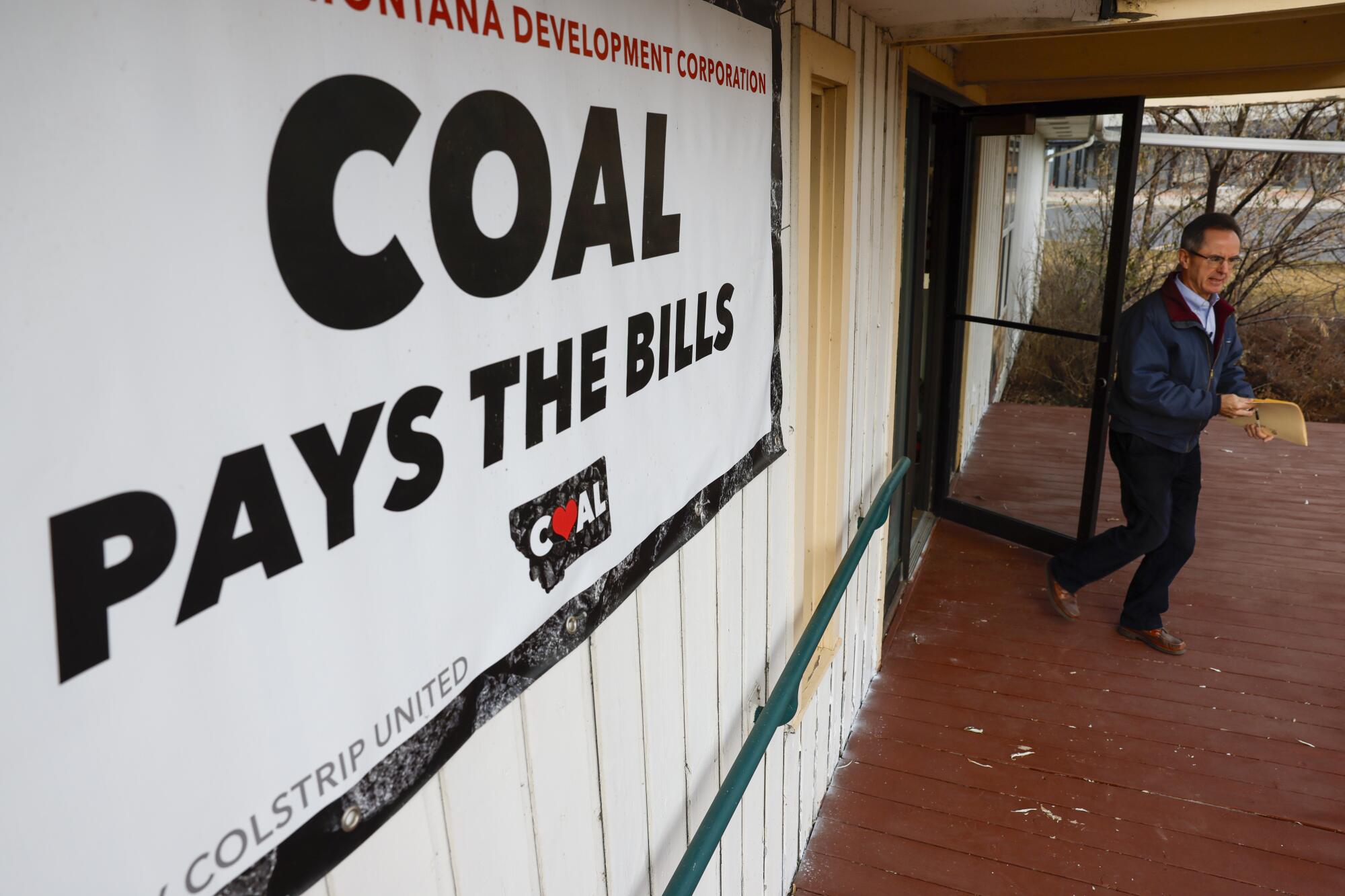
Jim Atchison steps out of his office in Colstrip.
(Robert Gauthier / Los Angeles Times)
I couldn’t have asked for a better tour guide than Atchison, who for 22 years has lived in Colstrip and led the Southeast Montana Economic Development Corp. He’s soft-spoken and meticulous, with a detailed itinerary for our day and a less ironclad allegiance to coal than many of the locals we’ll meet.
They include Bill Neumiller, a former environmental engineer at the power plant. We start our day with him, watching the sun rise over the smokestacks across the lake. He moved to Colstrip 40 years ago, when the coal plant was being built. He enjoys fishing in the well-stocked lake and teaching kids about its history, in his role as president of the parks district.
The plant, he says, pays the vast majority of the city’s property taxes.
“It’s been a great place to raise a family,” he says.
So many people have similar stories — the general manager of a local electrical contractor, the administrator of the health clinic. I especially enjoy chatting with Amber and Gary Ramsey, who have run a Subway sandwich shop here for 30 years.
“It takes us two to three hours to get through the grocery store, because you know everybody,” Gary says.
He didn’t plan to spend his life here. Sitting at a table at Subway, he tells us he grew up in South Dakota and went to college in North Dakota before taking a job teaching math and coaching wrestling in Colstrip. He planned to stay for a year or two.
Then he met Amber, who was working part time as a bartender and doing payroll at the coal plant.
“Forty years later, I’m still here,” he says. “We raised our kids here.”

The power plant’s smokestacks are visible from miles away in the town of Colstrip.
(Robert Gauthier / Los Angeles Times)
John Williams was one of the first Montana Power Co. employees to move to Colstrip, as planning for the plant’s construction got started. Today he’s the mayor. He’s well-versed in local history, from the first coal mining in the 1920s — which supplied railroads that later switched to diesel — to the economic revitalization when the Portland and Seattle areas came calling.
Unlike many of the other Colstrip lifers who share their stories, several of Williams’ kids have left town. But one of his sons lives in a part of Washington where some of the electricity comes from Colstrip. Same for another son who lives in Idaho.
It’s hard for Williams to imagine a viable future for his home without the power plant.
“I believe they are intimately tied together,” he says.
And what about climate change, I ask?
Nearly everyone in Colstrip has a version of the same answer: Even if it’s real, it’s not nearly as bad as liberals claim. And without coal power, blackouts will reign. West Coast city dwellers don’t understand how badly they need us here in Montana.
Atchison is an exception.
Yes, he’s dubious about climate science. And yes, he wants to save the mine and power plant. His office is plastered with pro-coal messages — a sign that says, “Coal Pays the Bills,” a magnet reading, “Prove you’re against coal mining: Turn off your electricity.”
But he knows the market for coal is shrinking as the nation’s most populous cities and most profitable companies increasingly demand climate-friendly energy. So he’s preparing for a future in which Colstrip has no choice but to start providing it.
“We have one horse in the barn now,” Atchison says. “We need to add two or three more horses to the barn.”

A conveyor belts carries coal from the Rosebud Mine to the Colstrip power plant.
(Robert Gauthier / Los Angeles Times)
Ever since President Obama started trying to tighten regulations on coal power, Atchison has been developing and implementing an economic diversification strategy for Colstrip. It involves expanding broadband capacity, building a business innovation center and broadening the local energy economy beyond coal. The transmission lines connecting Colstrip with the Pacific Northwest are an especially valuable asset, capable of sending huge amounts of clean electricity to the Pacific coast.
“Colstrip is evolving from a coal community into an energy community,” Atchison says. “We’re changing. We’re not closing.”
Already, Montana’s biggest wind farm is shipping electricity west via the Colstrip lines. A Houston company is planning another power line that would run from Colstrip to North Dakota. Federal researchers are studying whether Colstrip’s coal units could be replaced with advanced nuclear reactors, or with a gas-fired power plant capable of capturing and storing its climate pollution.
West Coast voters and politicians could speed up the evolution, for Colstrip and other coal towns. Instead of just congratulating themselves for getting out of coal, they could fund training programs and invest in clean energy projects in those towns.
They’ll never fully replace the ample jobs, salaries and tax revenues currently provided by coal. But nothing lasts forever. One hundred years is a pretty good run.

Some inconvenient truths
“Great God, how we’re doin’! We’re rolling in dough,
As they tear and they ravage The Earth.
And nobody knows…or nobody cares…
About things of intrinsic worth.”
—Wally McRae, “Things of Intrinsic Worth” (1989)
Growing up outside Colstrip in the 1970s could lead to strange moments for Clint McRae, the son of a cowboy poet.
He was a teenager then, and Montana Power Co. was working to build public support for Units 3 and 4 of the coal plant. One day his eighth-grade teacher instructed everyone who supported the new coal-fired generators to stand on one side of the classroom. Everyone opposed should stand on the other side.
McRae was the only student opposed.
“And then [the teacher] gave a lecture about how important the construction of these plants was and handed out bumper stickers that said, ‘Support Colstrip Units 3 and 4,’” McRae tells me, shaking his head. “It was terribly uncomfortable.”

Rancher Clint McRae was raised outside Colstrip and has followed in his father’s footsteps.
(Robert Gauthier / Los Angeles Times)
Later, his mom was doing laundry and found a pro-coal bumper sticker in his pants pocket. She showed it to his cattle rancher father, Wally, “and I guess he went over there [to the school] and kicked ass and took names,” McRae says with a laugh.
Fifty years later, he’s carrying on his dad’s legacy.
We spend a morning in the Colstrip area on McRae’s sprawling ranch, admiring sandstone rock formations and herds of black Angus cows. The scenery is harsh but elegant, rolling hills and pale green grasses and pink-streaked horizon lines.
“This country has a sharp edge to it,” McRae says, quoting a photographer who visited the property years ago.
The land has been in his family since the 1880s, when his great-grandfather emigrated from Scotland. He hopes his youngest daughter — who recently moved back home with her husband — will be the fifth generation to raise cattle here.
“And we just had a grandchild seven months ago, and she’s the sixth,” he says.

Rancher Clint McRae contemplates the environmental threats facing his family’s land.
(Robert Gauthier / Los Angeles Times)
McRae wears a cowboy hat and drives a pickup truck. He tells me right away that he’s “not the kind of person who participates in government programs unless I absolutely have to.” He’s certainly got no qualms about making a living selling beef.
But McRae and his forebears defy stereotypes.
His father, Wally, not only raised cows but was also a celebrated poet, appointed by President Clinton to the National Council on the Arts. In the 1970s, he joined with other ranchers to help found Northern Plains Resource Council, an advocacy group. They were moved to act by a utility industry plan for nearly two dozen coal plants between Colstrip and Gillette, Wyo.
“I and others like me will not allow our land to be destroyed merely because it is convenient for the coal company to tear it up,” Wally McRae said, as quoted in a 50th-anniversary book published by Northern Plains.
Now in his late 80s and retired from the ranch, Wally’s got every reason to be proud of his son.
Clint has fought to limit pollution from the coal plant his dad couldn’t stop — and to ensure the cleanup of dangerous chemicals already emitted by the plant and mine. He’s written articles calling for stronger regulation of coal waste, and slamming laws that critics say would let coal companies pollute water with impunity. Like his father, he’s a member of Northern Plains.
McRae wants me to know that even though he and his dad “damn sure have a difference of opinion” with many of the people who live in town, “it was never personal.” The coal plant employees are friends of his. He doesn’t want them to lose their jobs.
“Our kids went to school together, played sports together,” he says.

Rancher Clint McRae opens a gate on his family’s land outside Colstrip.
(Robert Gauthier / Los Angeles Times)
But even though McRae believes “we can have it both ways” — coal generation coupled with environmental protection — he’s not optimistic. And history suggests he’s right to be skeptical. Various analyses have found rampant groundwater contamination from coal plants, including Colstrip. Air pollution is another deadly concern. A peer-reviewed study last year estimated that fine-particle emissions from coal plants killed 460,000 Americans between 1999 and 2020.
Then there’s the climate crisis.
McRae doesn’t want to talk about global warming — “that’s not my bag,” he says. But he’s seen firsthand what it can look like.
In August 2021, the Richard Spring fire tore across 171,000 acres, devastating much of his ranch and nearly torching both of his family’s houses. He was on the front lines of the fast-moving blaze as part of the local volunteer firefighting crew. Temperatures topped 100 degrees, adding to the strain of dry conditions and fierce winds. McRae had never seen anything like it.
Two and a half years later, he’s still building back up his cattle numbers and letting the grass regrow.
“It burned all of our hay. It was awful,” he says.
McRae has a strong sense of history. As we drive toward the Tongue River, which forms a boundary of his ranch, he points out where members of the Arapaho, Lakota Sioux and Northern Cheyenne tribes camped before the Battle of the Little Bighorn in 1876, a few years ahead of his great-grandfather’s arrival in Montana. A few minutes later he stops to show off a series of tipi rings — artifacts of Indigenous life that he’s promised local tribes he’ll protect.
McRae is acutely aware that this wasn’t always ranchland — and that it probably won’t be forever.
“It’s gonna change,” he says. “Whether we embrace it or not.”

The wind and the water
Sturgeon. Bubbles. Salamander. Jimmy Neutron.
Those are “call signs” for some of the 13 employees at the Clearwater wind farm, where 131 turbines are spread across 94 square miles of Montana ranchland a few hours north of Colstrip. The nicknames are scrawled on a whiteboard in the trailer office.
Raptor. Goose. Sandman.
Clearly, they have fun here. And it’s an industry where you can make good money.

Turbines spin at sundown at NextEra Energy’s Clearwater wind farm, which sends power from Montana to Oregon and Washington.
(Robert Gauthier / Los Angeles Times)
Clearwater’s operator, Florida-based NextEra Energy, won’t disclose a salary range. But as of 2022, the median annual wage for a U.S. wind turbine technician working in electric power was $59,890, compared with $46,310 for all occupations nationally.
“If someone wants to stay close to home and still have a good career, we provide them that opportunity,” Alex Vineyard says.
Vineyard lives in nearby Miles City and manages Clearwater for NextEra, America’s largest renewable energy company. Clad in a hard hat, sweater vest and orange work gloves, he drives to a nearby turbine and walks up a staircase to show us the machinery inside. The tower is 374 feet high, meaning the tips of the blades reach 582 feet into the air.
Not far from here, hundreds of construction laborers are finishing the next two phases of the Clearwater project.

Alex Vineyard manages the Clearwater wind farm for NextEra, America’s largest renewable energy company.
(Robert Gauthier / Los Angeles Times)
“You can see where we build wind sites. It’s not downtown L.A.,” Vineyard says, the sunset casting a brilliant orange glow behind him. “Generally it’s rural areas — and there are limited opportunities for kids in those areas. Not a lot of great careers.”
Wind will never replace coal. The construction jobs are temporary, the permanent jobs far fewer.
But they’re better than nothing. A lot better.
As much as West Coast megacities owe it to coal towns like Colstrip to bring them along for the clean energy ride, coal towns like Colstrip owe it to themselves to take what they can get — and not let stubbornness or politics condemn them to oblivion.
Fortunately, they’ve got the power grid on their side.
In today’s highly regulated, thoroughly litigated world, long-distance power lines are incredibly hard to build. They can take years if not decades to secure all the necessary approvals — if they can get those approvals at all. As a result, wind and solar developers prize existing transmission lines, like those built to carry power from Colstrip and other coal plants to big cities.
The Clearwater wind farm offers a telling case study.
Two of Colstrip’s four coal units shut down in 2020 due to poor economics, opening up precious space on the plant’s power lines. That open space made it easier for NextEra to sign contracts to sell hundreds of megawatts of wind power to two of Colstrip’s co-owners, Portland General Electric and Puget Sound Energy — and thus get Clearwater built.

An electrical substation flanks the Colstrip power plant.
(Robert Gauthier / Los Angeles Times)
Montana wind is especially useful for Oregon and Washington because it blows strongest during winter, when those states need lots of energy to stay warm. On that front, Clearwater has been a huge success. During its first winter, it had a capacity factor of 60%, meaning it produced 60% of all the power it could possibly produce, if there were enough wind 24/7.
Sixty percent is a lot — “like a home run,” Puget Sound Energy executive Ron Roberts says.
He and his colleagues want more. Puget Sound plans to build more Montana wind turbines to serve its Washington customers — again taking advantage of the Colstrip power lines.
West Coast states need to keep investing in exactly this type of project if they hope to persuade their conservative neighbors to stop fighting to save coal. The more they can bring the benefits of wind and solar power to the rest of the West, the better.
And what about those low-wind, cloudy days when wind turbines and solar panels aren’t enough to avoid blackouts?
Carl Borgquist has a plan for that.
I meet up with him near Gordon Butte — a flat-topped landmass that juts up 1,025 feet from the floor of Montana’s Musselshell River valley, four hours west of Colstrip but just over five miles from the coal plant’s power lines. There are already wind turbines atop the butte, built by the landowning Galt family with Borgquist’s help.
Borgquist assures me as we drive to the top that I’ll soon understand why this steep butte is perfect for energy storage.
“It will intuitively make sense, the elegance and simplicity of gravity as a storage medium,” he says.

Carl Borgquist admires the views from atop Gordon Butte, where he’s got plans for a pumped storage project to augment Montana wind power.
(Robert Gauthier / Los Angeles Times)
There will be two reservoirs — one up on the butte, another 1,000 feet below. They’ll be filled with water from a nearby creek.
During times of day when there’s extra power on the Western electric grid — maybe temperatures are moderate in Portland and Seattle, but Montana winds are blowing strong — the Gordon Butte project will use that extra juice to pump water uphill, from the lower reservoir to the upper reservoir. During times of day when the grid needs more power — maybe there’s a record heat wave, and not enough wind to go around — Gordon Butte will let water flow downhill, generating electricity.
It’s called pumped storage, and it’s not a new concept. But compared with other proposals across the parched West, this one is almost miraculously noncontroversial. No environmentalists making hay over water use. No nearby residents crying foul.
Borgquist still needs to sign up a utility customer, or he would have already flipped Gordon Butte to a developer better suited to build the $1.5-billion project, which will employ 300 to 500 people during construction. But Borgquist is confident that before too long, one or two of the Pacific Northwest electric utilities preparing to ditch Colstrip will see the light.
“I’ve been waiting for the market to catch up to me,” he says.
Let’s hope it catches up soon. Because even though pumped storage won’t keep us heated and cooled and well-lit every hour of every day, neither will wind, or solar, or batteries, or anything else. No one technology will solve all our climate problems.
The sooner we learn that lesson, the sooner we can move on to the hard part.

The Colstrip power lines run near Gordon Butte, carrying coal-fired electricity — and increasingly wind energy — from Montana to Oregon and Washington.
(Robert Gauthier / Los Angeles Times)

The art of the deal
I find myself wandering the halls of the state Capitol in Helena. Christmas is a few weeks away, and there’s a spectacular tree beneath the massive dome, flanked by murals of white settlers and Indigenous Americans.
On a whim, I step into Gov. Greg Gianforte’s office and ask if he’s in. Gianforte has fought to keep the Colstrip plant open, and I want to ask him about it. I’m also curious to meet a man who easily won election despite having assaulted a journalist.
One of his representatives takes down my contact info. I never get an interview.
Despite the state’s deep-red turn in recent years, Montanans have a history of environmental consciousness, owing to their love of fishing, hunting and the great outdoors (as seen in the film “A River Runs Through It”). They approved a new state constitution in 1972 that enshrined the right to a “clean and healthful environment in Montana for present and future generations.”
To the frustration of Gianforte and his supporters, that right may include a stable climate.
This time last year, a Montana judge revoked the permit for a gas-fired power plant being built by the state’s largest electric utility, NorthWestern Energy, along the banks of the Yellowstone River. The judge ruled that the state agency charged with approving the gas plant had failed to consider how the facility’s heat-trapping carbon emissions would contribute to the climate crisis.

NorthWestern Energy says this gas-fired power plant on the Yellowstone River is needed to help keep the lights on for homes and businesses.
(Robert Gauthier / Los Angeles Times)
Legislators responded by rushing to pass a law that barred state agencies from considering climate impacts.
The Yellowstone River gas plant moved forward, but the law didn’t last long. A few months after it passed, another judge ruled in favor of 16 young people suing the state over global warming, agreeing that the legislation violated their constitutional right to a clean and healthful environment.
“This is such a solvable problem,” says Hedges, the Montana environmentalist critical of coal mining. “It’s just that nobody wants to solve it.”
Hedges is a leader of the Montana Environmental Information Center, where she’s spent three decades battling for clean air, clean water and a healthy climate. It was her advocacy group, along with the Sierra Club, that sued Montana over the state’s approval of the Yellowstone River gas plant, setting off the chain of increasingly consequential court rulings.
But as mad as she is at Gianforte — and at the local utility company executives who insist they need coal to keep the lights on in Montana — Hedges is at her most caustic when discussing the Pacific Northwest environmentalists who, in her view, have failed to do everything they can to get the Colstrip power plant shut down.
That includes the Sierra Club, which, Hedges says, has shifted its focus too quickly from shutting down coal plants to blocking the construction of new gas plants — even in places such as Montana, where coal, the dirtiest fossil fuel, isn’t dead yet.
Hedges’ frustration also includes the Washington state lawmakers who passed a much-lauded bill, signed by Gov. Jay Inslee, requiring electric utilities to stop buying coal power by 2025 — only to sit idly by as some of those utilities then made arrangements to give away their shares in the Colstrip plant to coal-friendly co-owners rather than negotiate agreements to shut the coal units.
“So they’re not actually decreasing carbon dioxide emissions even a little tiny bit. They are allowing this plant to continue, instead of using their vote to close this source of pollution. It’s maddening,” Hedges says.
1

2

3

1. A lone tumbleweed blows through piles of coal at the Rosebud Mine outside Colstrip, a few miles from the power plant. 2. Coal is prepped for transport at the mine. 3. Coal is transferred to a truck at the mine. (Robert Gauthier / Los Angeles Times)
Washington officials say they tried to get Colstrip shut down but were stymied by the plant’s complicated six-company ownership structure, and by the Montana Legislature’s staunch support for coal. Sierra Club activists, meanwhile, say they’re still pushing for Colstrip’s closure, and for coal shutdowns across the country — even as they also oppose the construction of gas plants.
“From a climate perspective, gas is just as bad as coal,” says Laurie Williams, director of the Sierra Club’s Beyond Coal campaign.
To avoid a future of ever-more-dangerous fires, floods and heat, we need to ditch both fossil fuels — fast.
This is the hard part. This is the part that will require compromise — for conservatives who believe anything smacking of climate change is “woke” liberal propaganda, and for liberals who want nothing to do with conservatives spouting that belief.
So how do we do it? How do we stop clashing and start cooperating?
First off, West Coasters need to engage in good faith with the people who have supplied their power for decades — and strike deals that might persuade those red-staters to move on from coal. Deals like building more wind farms in Montana and not as many back home, even if that means fewer union jobs and lower tax revenues for California, Oregon and Washington.
It’s great that the coastal states are targeting 100% clean energy, but it’s not enough. They must bring the rest of the West along for the ride, or it won’t matter. Every solar farm in California is undermined by every ton of coal burned at Colstrip.
The lesson for folks who live in Colstrip and other Western coal towns might be even more difficult to swallow.
L.A. and Phoenix and Portland have funded your comfortable lifestyles a long time. Now they want something different.
If Colstrip wants to stick around, it needs to start offering something different.

Climate activist Anne Hedges stands in a public park near the Colstrip power plant.
(Robert Gauthier / Los Angeles Times)
It’s easy to see why that’s a scary prospect. After we finish exploring the coal mine with Hedges, we drive into town and stop at one of the immaculately maintained public parks. The power plant’s two active smokestacks aren’t far, looming 692 feet over a swing set and red-and-blue bench with the letters “USA” carved into the backing.
“The climate doesn’t care who owns the power plant,” Hedges says, as steam and carbon and soot spew from the stacks.
The climate won’t care any more when Houston-based Talen Energy — which operates the plant, and which didn’t respond to requests for a tour or interview — becomes the facility’s largest owner next year, acquiring Puget Sound Energy’s shares.
Our ability to solve this problem doesn’t depend on which company is profiting off all that coal.
What it does depend on is our willingness to make hard choices, ranchers and miners and activists setting aside their differences and writing the West’s next chapter together, rather than fighting so long and so hard that the tale ends badly for everyone.
Change is scary. But it’s inevitable. Cowboy poet Wally McRae learned that the hard way.
Maybe 50 years from now, his great-grandchildren will wax poetic about the beauty of Colstrip without coal.
Support our journalism
Your support helps us deliver the news that matters most. Subscribe to the Los Angeles Times.

The early-morning sky glows red over the town of Colstrip.
(Robert Gauthier / Los Angeles Times)
Business
Google fired at least 20 additional workers after last week's Gaza protest, group says

Google fired additional workers this week, after it initially terminated 28 people who it said participated in recent protests against the company’s work in Israel.
The total number of employees terminated in the wake of the protests — which took place inside Google offices in New York and Sunnyvale, Calif. — has grown to more than 50 people, with more than 20 people ousted on Monday night, according to the No Tech for Apartheid Campaign, the advocacy group that organized the sit-ins.
Google, in a statement, confirmed that the company had cut additional workers as a result of its investigation into the protests, but did not say how many. The spokesperson said it took more time to identify some of the participants because their faces were concealed by masks and they weren’t wearing their employee badges.
“Our investigation into these events is now concluded, and we have terminated the employment of additional employees who were found to have been directly involved in disruptive activity,” the company said. “To reiterate, every single one of those whose employment was terminated was personally and definitively involved in disruptive activity inside our buildings. We carefully confirmed and reconfirmed this.”
The protest group has previously decried the firings and alleged that some of the terminated protesters didn’t participate directly in the events, a contention that Google vigorously disputed.
“Google is throwing a tantrum because the company’s executives are embarrassed about the strength workers showed at last Tuesday’s historic sit-ins, as well as their botched response to them,” No Tech for Apartheid Campaign said in a statement. “Now, the corporation is lashing out at any worker that was physically in the vicinity of the protest — including those who were not at all involved in the campaign.”
On April 16, the campaign held rallies outside of Google offices. Dozens of employees sat for hours in sit-ins the New York City and Sunnyvale locations, and nine people were arrested for trespassing.
The campaign is pushing for the company to drop its cloud computing contract with the Israeli government and military, called Project Nimbus. The group said that it will continue to demand that Google drop Project Nimbus, protect Palestinian, Arab and Muslim employees and reinstate the workers who were terminated.
After the protests and sit-ins, Google last week said it had fired the first 28 employees for violating company policy governing employee conduct and harassment.
In a blog post last week, Google Chief Executive Sundar Pichai wrote that while it is important to preserve the company’s culture of open discussion, Google must maintain a professional workplace.
“[O]ur policies and expectations are clear: this is a business, and not a place to act in a way that disrupts coworkers or makes them feel unsafe, to attempt to use the company as a personal platform, or to fight over disruptive issues or debate politics,” Pichai wrote.
Protests in the tech industry have escalated in the wake of Israel’s bombardment of the Gaza Strip, which began in response to the Oct. 7 attack on Israel by Hamas-led militants in which an estimated 1,200 people were killed and about 240 taken hostage.
More than 34,000 Palestinians in Gaza have been killed in Israel’s air and ground offensive, according to Gaza health officials.
“Google pays us enough to not think too much about what they are doing, but it wasn’t worth it,” said Hasan Ibraheem, one of the fired employees, during a Monday news conference. “I wanted to support my co-workers who have been harassed for standing up against this project.”
Google has said that its technology is used to support numerous governments around the world, including Israel’s, and that the Nimbus contract is for work running on its commercial cloud network, with the Israeli government ministries agreeing to comply with Google’s terms of service and acceptable use policy.
“This work is not directed at highly sensitive, classified, or military workloads relevant to weapons or intelligence services,” Google said in a statement.
But former Google employees at the news conference questioned how the company would enforce the terms of service and called for more transparency. They also disputed the characterization that they were disrupting the work of other employees.
-

 World6 days ago
World6 days agoIf not Ursula, then who? Seven in the wings for Commission top job
-
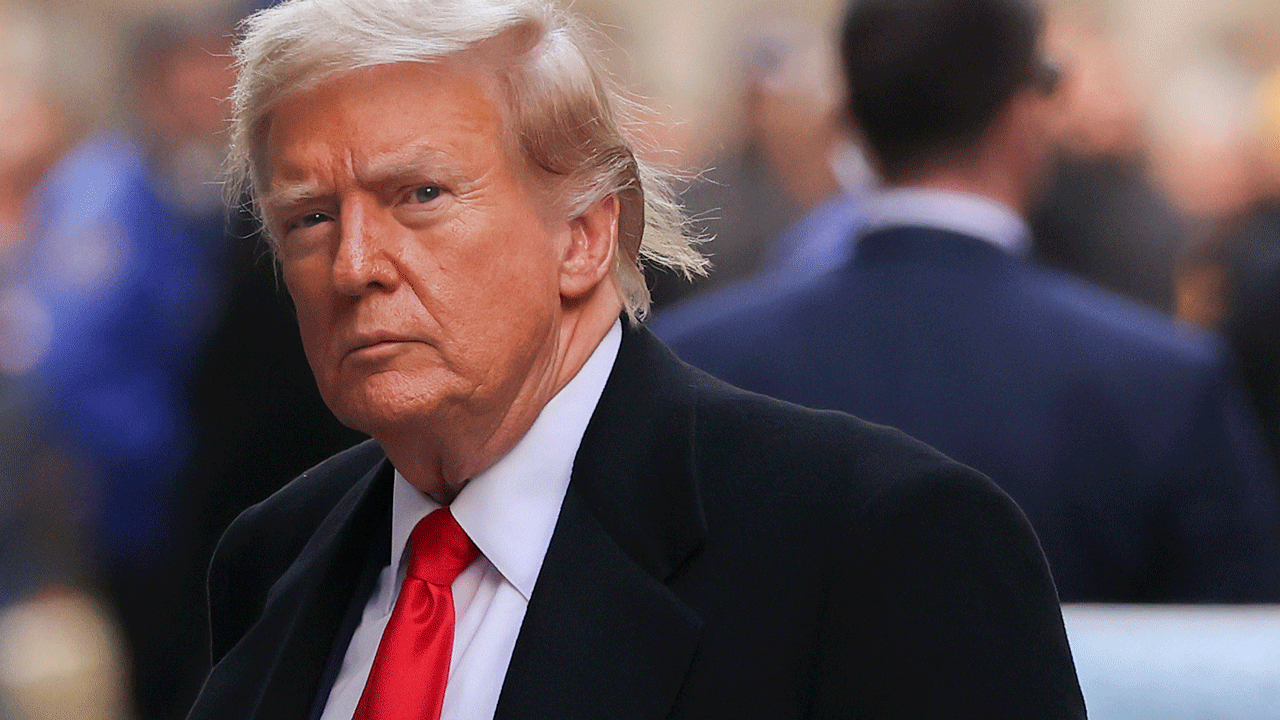
 Politics1 week ago
Politics1 week agoNine questions about the Trump trial, answered
-

 World1 week ago
World1 week agoHungary won't rule out using veto during EU Council presidency
-

 Movie Reviews1 week ago
Movie Reviews1 week agoFilm Review: Season of Terror (1969) by Koji Wakamatsu
-

 World1 week ago
World1 week agoCroatians vote in election pitting the PM against the country’s president
-

 World1 week ago
World1 week agoGroup of EU states should recognise Palestine together, Michel says
-

 Politics6 days ago
Politics6 days agoTrump trial: Jury selection to resume in New York City for 3rd day in former president's trial
-

 World1 week ago
World1 week agoThe Take: How Iran’s attack on Israel unfolded


/cdn.vox-cdn.com/uploads/chorus_asset/file/25415491/DSC08587.JPG)
